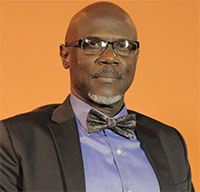…for small developing states: (Part 2)
Examining the Green Economy Pathway
…the role of Interests, Identity and Norms (Part1)
IN this three-part series we will look at the role of interests, identity and norms in the

context of the green economy pathway. In this first part the role of interests will be examined and in Parts 2 and 3, the role of identity and norms will be examined.
We agree that the green economy is a wide developmental concept whose pillars mirror those of sustainable development. In fact, sustainable development and green economy are sometimes used interchangeably, since both rely on environmental efficiency, social equity and economic prosperity. In like manner, ‘green growth is used interchangeably with ‘green economy’. However, an examination of the literature on the green economy revealed, among others, the following emerging concepts and variables that are relevant to Guyana, as a small developing state (SDS), in its pursuit of a green economy. While we will examine SDSs as a grouping, we do assert that its findings are relevant to Guyana.
Some Emerging Variables
The following variables have emerged from exploring the characteristics of Guyana as a SDS. In terms of UNFCCC obligations, we observed the existence of limited technology transfer; doubts about what constitutes new and additional funding and the application of common but differentiated responsibilities and respective capabilities.
With respect to climate adaptation finance (CAF) for SDSs, we found insufficient availability of financial funds; limited innovative financing; difficulties in differentiating between overseas development assistance (ODA) and new and additional finance; uncertainty about funding beyond the green climate fund (GCF); uncertainty about quantity of adaptation funds; different approaches to estimating adaptation costs; uncertainty about the actual costs of adaptation and definition of incremental costs.
In the context of international finance, an examination of the literature revealed a high degree of unpredictability of pledged funds; absence of verifiable, measurable and reportable indicators of new and additional finance; limited micro-financing opportunities; asymmetries in international financial cooperation; high international and financial transaction costs. With regard to adaptation, we found uncertainty about adaptation measures, adaptation deficits and adaptation abatement.
Whereas, in the context of the economics and the environment, we observed a north-south divide on interrelationship between economic development and the environment; an unclear understanding of the interdependence of ecological, social and economic systems; unequal balancing of economic activities and enviromental sustainability and difficulties in balancing assimilative and regenerative capacities of the biosphere.
Finally, on governance, we found uncertainty of the meaning of vulnerability; an academic view that SDSs, as a generic category, was too small a group for analysis; fragmented global climate governance; difficulties mainstreaming adaptation into development; limited cognition and climate policy integration; deficiency in balancing information flow to and from citizens through institutions; too much influence of non-state actors; imposed emissions reductions on SDSs and protection of intellectual property as a barrier to technology transfer.
Against this backdrop of multiple variables, we now look at our findings on the role Interests play in the pursuit of a green economy in Guyana.
Interests
ODA, Additional Finance and Mainstreaming Adaptation
We believe that a significant number of the emerging variables within this study represent interests within the context of states, non-state actors and institutions. We found that difficulties in differentiating between ODA and new and additional finance is a constructed interest influenced by state and non-state actors for the benefit of the powerful actors and agents within the International Climate Change Regime (ICCR). Consequently, this interest enjoys only inter-subjective meanings and shared understandings amongst the powerful actors and agents within the ICCR, excluding the SDSs grouping in the process, who continue to argue that new and additional funding as provided for under the UNFCCC convention excludes ODA.
Equally, verifiable, measurable and reportable new and additional finance, as an interest, represents inter-subjective understandings and relationships amongst the powerful actors and agents within the ICCR. In fact, the levers of control to measure, verify and report new and additional finance are located within the institutions of the powerful actors.
Similarly, mainstreaming adaptation into development planning is an interest viewed by SDSs as constructed to benefit international financial institutions, which in turn leverage national financial mechanisms within the SDSs grouping. The mutual, constitutive relationship between agents and this ideational structure is limited to the influential international financial organisations. However, SDSs continue to advocate that mutuality and acceptance of a full understanding of adaptation is necessary for this interest to be construed as universal.
Interdependence, Inter-relationships and Technology Transfer
Likewise, climate policy integration, as an interest, is driven by the concerns for reducing green house gases (GHGs)- a climate change activity not required by SDSs under the UNFCCC- but yet imposed on SDSs by the ideational structures within the ICCR. We found that there is no mutually constitutive relationship between these actors (within the ICCR) and SDSs.
Correspondingly, interrelationship between economic development and the environment; interdependence of ecological, social, and economic systems; interdisciplinary collaboration among key sectors and balancing economic activities and enviromental sustainability are interests constructed for the benefit of the powerful within the ICCR, especially since SDSs have no real endogenous capability of realizing these outputs without international assistance and cooperation. We believe these interests should enjoy shared understandings and mutually constituted relationships across all actors within the ICCR, in aprticular SDSs and be allowed to develop into norms of substance within the environmental regime.
We found that technology transfer is an embedded provision within the UNFCCC and a declared expectation in the outcomes of the major SDSs conferences. Ideally and, using a norm development pathway, technology transfer should have reached norm status by now. Historical conditioning of technology transfer residing in the developed ‘north’ also contributed to shaping its characteristics. Nonetheless, this interest enjoys wide inter-subjective meaning and understandings, but is still more material than ideational. We also believe that protection of intellectual property is a competing interest to technology transfer and consequently inhibits the growth of technology transfer into an ideational structure. Of course, the powerful actors and agents enjoy asymmetrical technological advantages over SDSs.
International Transactions Costs and Global Climate Governance
We believe that high international transactions costs is a constructed interest, which results in increased financial transactions for SDSs. Inter-subjective meanings and understandings and mutually constituted agents and structures are limited to the key actors in the ICCR. We found that high international transactions costs are conditioned more by financial security considerations rather than objective calculation. Here again, the ICCR has constructed other complimentary interests such as ‘lack of confidence in financial and accounting institutions in SDSs’ with shared meanings amongst the major actors within the ICCR. Additionally, micro financing is an important interest for SDSs.
Though there is evidence of mutual construction, inter-subjective meanings and ideational congruence, we believe that interests such as lack of confidence in financial institutions and high transactions costs serve to militate against the benefits therefrom. We also believe that other financial-related interests helpful to SDSs, such as innovative financing, promoted by academics in the literature, is unable to be socially constructed by SDSs, since it represents a contrasting position to the major financial actors within the ICCR.
Capitalizing the GCF is undoubtedly a keen interest of SDSs and of the key actors within the ICCR. However, we found that the ideational structures that shape the quantum of CAF is exclusive to the SDSs grouping. In many respects, the funding regime within the ICCR seem to have developed an identity which suggests that the task of quantifying CAF is a deliberative, peculiar to the funding regime.
Finally, we found that global climate governance, as an interest, reflects in SDSs and the wider ICCR. However, global climate governance is dominated by the developed states within the ICCR through identity formation within groupings such as Conference of the Parties (COPs), International Panel on Climate Change (IPCC) and others, even though there is also identity formation within SDSs, such the OASIS grouping. Consequently, ideational structures to support these identity formations are compartmentalised into shared meanings, rules, practices and norms reflected of the more powerful actors.
As a SDS, Guyana should concentrate on embedding within its foreign policy its green development pathway as a critical vehicle to develop a green state and influence its CARICOM colleagues to adopt a similar pathway in order to develop inter-subjective and ideational meanings and symmetry towards constructed interests relevant to the green economy.
Next Sunday we will look at the role Identity plays in greening Guyana’s economy.
Mr Gary A R Best is a retired Rear Admiral and former Chief of Staff of the Guyana Defence Force. He is an Attorney at Law and the Presidential Advisor on the Environment. He is a PhD candidate at the University of the West Indies. He holds a BSc in Nautical Science (Brazil) and Masters Degrees from the University of the West Indies and the University of London. He is also an alumnus of the National Defence University and Harvard Kennedy School. His research areas include, climate change governance, climate change finance, international relations and environmental law.
Comments can be sent to towardsagoodlife@gmail.com












